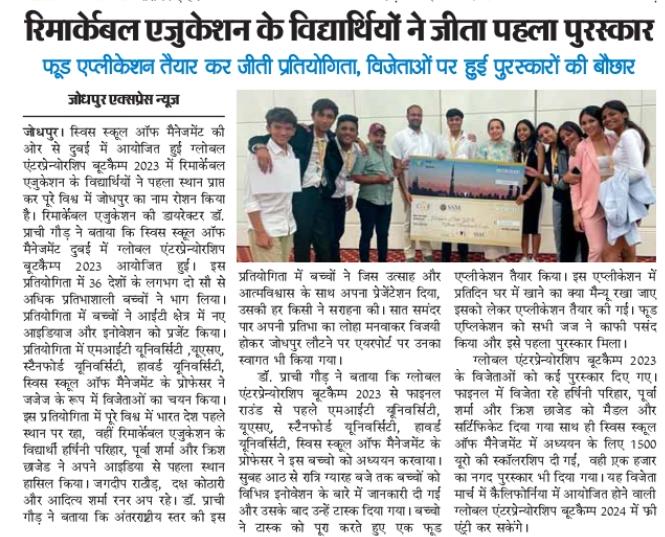
Beyond Textbooks
Beyond Textbooks: Integrating Experiential Learning into Modern Education
In today's rapidly evolving world, education is undergoing a transformation. Traditional methods of teaching, centered around textbooks and classroom lectures, are giving way to more dynamic and interactive approaches. Experiential learning is emerging as a powerful paradigm that transcends traditional boundaries, offering students a deeper and more holistic understanding of concepts. In this blog, we delve into the concept of experiential learning and explore how integrating it into modern education can enhance students' skills, engagement, and readiness for the real world.
Understanding Experiential Learning
Experiential learning is a pedagogical philosophy that emphasizes the importance of learning through direct experience, reflection, and active engagement. Instead of passively absorbing information from textbooks, students actively participate in real-world scenarios that require critical thinking, problem-solving, and practical application of concepts. This approach encourages students to make connections between theoretical knowledge and practical situations, ultimately fostering a deeper understanding of the subject matter.
The Pillars of Experiential Learning
- Engagement: Experiential learning promotes active engagement by involving students in hands-on activities, simulations, experiments, and fieldwork. This hands-on approach ignites curiosity and motivates students to take ownership of their learning journey.
- Reflection: After experiencing a real-world scenario, students are prompted to reflect on their actions, decisions, and outcomes. Reflection bridges the gap between experience and learning by encouraging students to analyze what worked, what didn't, and how they can improve in the future.
- Application: Experiential learning encourages students to apply theoretical knowledge in practical settings. This application not only reinforces understanding but also equips students with skills they can readily use beyond the classroom.
- Collaboration: Many experiential learning activities are collaborative in nature. Students often work in teams, simulating real-world situations where teamwork and effective communication are crucial. This prepares them for the collaborative environments they'll encounter in their careers.
Benefits of Experiential Learning in Modern Education
- Enhanced Retention: Experiential learning makes learning more memorable. When students engage with concepts in real-life contexts, they form stronger neural connections, leading to better retention and recall of information.
- Critical Thinking: Experiential learning challenges students to think critically and make decisions based on real-time feedback. This hones their problem-solving skills and encourages them to approach challenges creatively.
- Preparation for the Real World: The skills acquired through experiential learning—such as adaptability, decision-making, and collaboration—are highly valued in the workforce. Students graduate with practical skills that go beyond theoretical knowledge.
- Increased Engagement: The interactive nature of experiential learning captures students' attention and enthusiasm. This can lead to improved attendance, participation, and overall motivation to learn.
- Diverse Learning Styles: Experiential learning caters to diverse learning styles. While some students excel through visual or auditory methods, others thrive in hands-on or kinesthetic environments. Experiential learning allows for customization and inclusivity.
Implementing Experiential Learning
- Curriculum Design: Educators should integrate experiential learning activities into the curriculum, aligning them with learning objectives. Activities could include case studies, simulations, role-playing, projects, and field trips.
- Technology Integration: Technology can enhance experiential learning by providing virtual simulations, interactive platforms, and remote collaborations. Virtual reality (VR) and augmented reality (AR) can immerse students in realistic scenarios.
- Community Engagement: Partnering with local businesses, organizations, and community members can provide students with authentic experiences and opportunities to contribute to real-world projects.
- Assessment Strategies: Assessment methods should evaluate not only the final outcomes but also the process of learning and reflection. Portfolios, presentations, and reflective essays can capture students' growth.
Experiential learning is more than just a trend; it's a shift towards a more dynamic and effective educational paradigm. By breaking free from the confines of textbooks and traditional lectures, modern education can embrace experiential learning to foster skills that are essential for success in the real world. As educators, parents, and society at large recognize the value of hands-on, reflective, and collaborative learning experiences, the integration of experiential learning into education is poised to shape the leaders, thinkers, and problem-solvers of tomorrow. Need more assistance with your career aspirations and profile-building efforts? Remarkable Education is available to help. You can contact them directly at +918690804533.









